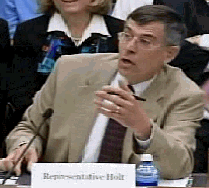
|
|
|
|
|
|
|
News & Views item - October 2006 |

![]() A
Physicist Who Sits in the US House of Representatives Does a Question and Answer
Session with Nature. (October 20, 2006)
A
Physicist Who Sits in the US House of Representatives Does a Question and Answer
Session with Nature. (October 20, 2006)
Rush Holt (58) earned his BA in Physics from Carleton College in Minnesota and and obtained Masters and Ph.D degrees at New York University. From 1980-1988 he was acting chief, Nuclear and Scientific Division, Office of Strategic Forces, United States Department of State, and from 1987-1989 assistant director, Princeton Plasma Physics Laboratory until he was elected to represent New Jersey's 12th district (it contains Princeton University) in the US House of Representatives in 1998.
Dr Holt is one of the Democratic Party's most prominent spokesmen on science, education and security. Nature's Colin Macilwain asked him about the life of a scientist on Capitol Hill, and what the mid-term elections could mean for science and education.
Below are some excepts from Nature's interview:
What difference would it make to science, or to scientists in America, if the Democrats took control of the House of Representatives?
The atmosphere in Washington is more politically partisan than I have seen in half a century, and it even affects things like science. I've never believed that science is completely removed from policy or politics. But many scientists would say they are appalled at the way a political game has been made of science, such as intelligent design in the schools, where both the president and some in Congress have said that both this and evolution should be taught. And climate change — until very recently it's been difficult to get anyone to acknowledge that there is climate change and that there is any connection with human activity.
Are scientific issues arising as issues in campaigns around the country?
Not as major issues, but in my district there is a kind of frustration that we've been unable to deal with energy problems — it might be high fuel prices, but somewhere in the voters' minds it is connected with a failure to find alternatives to fossil fuels, and a failure to listen to scientific analysis on climate change and that sort of thing.
What about involving the public in decision-making? A lot of discussion happens in Europe but it doesn't seem to get much traction in the United States.
I think it is fair to say, and unfortunate to note, that the public is not driving the science agenda. I wish they were. In the United States we have found ourselves in a position where the public says, 'science is for the scientists, but not for me'. Not often do any non-science or non-engineering constituents come to me with science or technology on their list, and I imagine that's true for other members of Congress as well.
You've said that most people in Congress tend to view science as a special interest, albeit an intelligent one. Have you seen much change in how Congress views science?
The public's appreciation of science is no better, and maybe a little worse, than a decade ago. In official Washington, scientific subjects have become really politicized. There should be debate about the policy that is derived from science. But, historically, if science puts limits on the choices that are possible, the politicians would accept that. Now, by treating science as just another topic to be dealt with ideologically, or to be part of political trades, they will even ignore the laws of science.